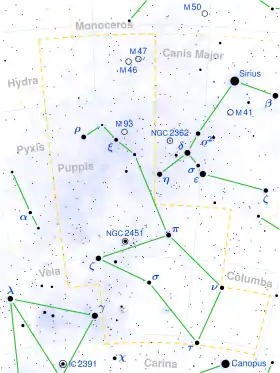1 Puppis
1 Puppis is a single[11] star in the southern constellation of Puppis. It lies in the northern part of the constellation at a distance of 650 ly,[1] east of Aludra in Canis Major and just above the white supergiant, 3 Puppis. This object is visible to the naked eye as a faint, red-hued star with an apparent visual magnitude of 4.59.[2] It is moving further from the Earth with a heliocentric radial velocity of +32.4 km/s.[4]
| Observation data Epoch J2000 Equinox J2000 | |
|---|---|
| Constellation | Puppis |
| Right ascension | 07h 43m 32.38675s[1] |
| Declination | −28° 39.1746′[1] |
| Apparent magnitude (V) | 4.59[2] |
| Characteristics | |
| Spectral type | M1III[3] |
| U−B color index | +1.94[2] |
| B−V color index | +1.63[2] |
| Astrometry | |
| Radial velocity (Rv) | +32.40[4] km/s |
| Proper motion (μ) | RA: −13.73[5] mas/yr Dec.: +30.01[5] mas/yr |
| Parallax (π) | 5.0415 ± 0.1968[1] mas |
| Distance | 650 ± 30 ly (198 ± 8 pc) |
| Absolute magnitude (MV) | −2.24[6] |
| Details | |
| Radius | 84[7] R☉ |
| Luminosity | 1,585 - 1,644[7] L☉ |
| Surface gravity (log g) | 0.32[8] cgs |
| Temperature | 3,986±170[7] K |
| Metallicity [Fe/H] | −0.19[8] dex |
| Rotational velocity (v sin i) | 1.0[9] km/s |
| Other designations | |
| Database references | |
| SIMBAD | data |
This is a red giant star with a stellar classification of M1 III,[3] having exhausted the hydrogen at its core and evolved away from the main sequence. The star is radiating 1,509 times the luminosity of the Sun from its enlarged photosphere at an effective temperature of 4,111 K.[8] It has several visual companions: component B, of magnitude 13.7 and angular separation of 26″, C, of magnitude 9.21 and separation 78.8″, and D, of magnitude 10.84 and separation from C of 1.3″.[12]
References
- Brown, A. G. A.; et al. (Gaia collaboration) (August 2018). "Gaia Data Release 2: Summary of the contents and survey properties". Astronomy & Astrophysics. 616. A1. arXiv:1804.09365. Bibcode:2018A&A...616A...1G. doi:10.1051/0004-6361/201833051. Gaia DR2 record for this source at VizieR.
- Ducati, J. R. (2002). "VizieR Online Data Catalog: Catalogue of Stellar Photometry in Johnson's 11-color system". CDS/ADC Collection of Electronic Catalogues. 2237. Bibcode:2002yCat.2237....0D.
- Abt, Helmut A. (2008). "Visual Multiples. IX. MK Spectral Types". The Astrophysical Journal Supplement Series. 176 (1): 216–217. Bibcode:2008ApJS..176..216A. doi:10.1086/525529.
- Gontcharov, G. A. (2006). "Pulkovo Compilation of Radial Velocities for 35 495 Hipparcos stars in a common system". Astronomy Letters. 32 (11): 759–771. arXiv:1606.08053. Bibcode:2006AstL...32..759G. doi:10.1134/S1063773706110065. S2CID 119231169.
- Van Leeuwen, F. (2007). "Validation of the new Hipparcos reduction". Astronomy and Astrophysics. 474 (2): 653–664. arXiv:0708.1752. Bibcode:2007A&A...474..653V. doi:10.1051/0004-6361:20078357. S2CID 18759600. Vizier catalog entry
- Anderson, E.; Francis, Ch. (2012). "XHIP: An extended hipparcos compilation". Astronomy Letters. 38 (5): 331. arXiv:1108.4971. Bibcode:2012AstL...38..331A. doi:10.1134/S1063773712050015. S2CID 119257644. Vizier catalog entry
- Messineo, M.; Brown, A. G. A. (2019). "A Catalog of Known Galactic K-M Stars of Class I Candidate Red Supergiants in Gaia DR2". The Astronomical Journal. 158 (1): 20. arXiv:1905.03744. Bibcode:2019AJ....158...20M. doi:10.3847/1538-3881/ab1cbd. S2CID 148571616.
- Earle Luck, R. (2014). "Parameters and Abundances in Luminous Stars". The Astronomical Journal. 147 (6): 137. Bibcode:2014AJ....147..137L. doi:10.1088/0004-6256/147/6/137.
- Glebocki, R.; Gnacinski, P. (2005). "VizieR Online Data Catalog: Catalog of Stellar Rotational Velocities (Glebocki+ 2005)". VizieR On-line Data Catalog: III/244. Originally Published in: 2005csss...13..571G; 2005yCat.3244....0G. 3244. Bibcode:2005yCat.3244....0G. Vizier catalog entry
- "1 Pup". SIMBAD. Centre de données astronomiques de Strasbourg. Retrieved 2019-04-13.
- Eggleton, P. P.; Tokovinin, A. A. (September 2008). "A catalogue of multiplicity among bright stellar systems". Monthly Notices of the Royal Astronomical Society. 389 (2): 869–879. arXiv:0806.2878. Bibcode:2008MNRAS.389..869E. doi:10.1111/j.1365-2966.2008.13596.x. S2CID 14878976.
- Mason, Brian D.; Wycoff, Gary L.; Hartkopf, William I.; Douglass, Geoffrey G.; Worley, Charles E. (2001). "The 2001 US Naval Observatory Double Star CD-ROM. I. The Washington Double Star Catalog". The Astronomical Journal. 122 (6): 3466. Bibcode:2001AJ....122.3466M. doi:10.1086/323920. Vizier catalog entry
